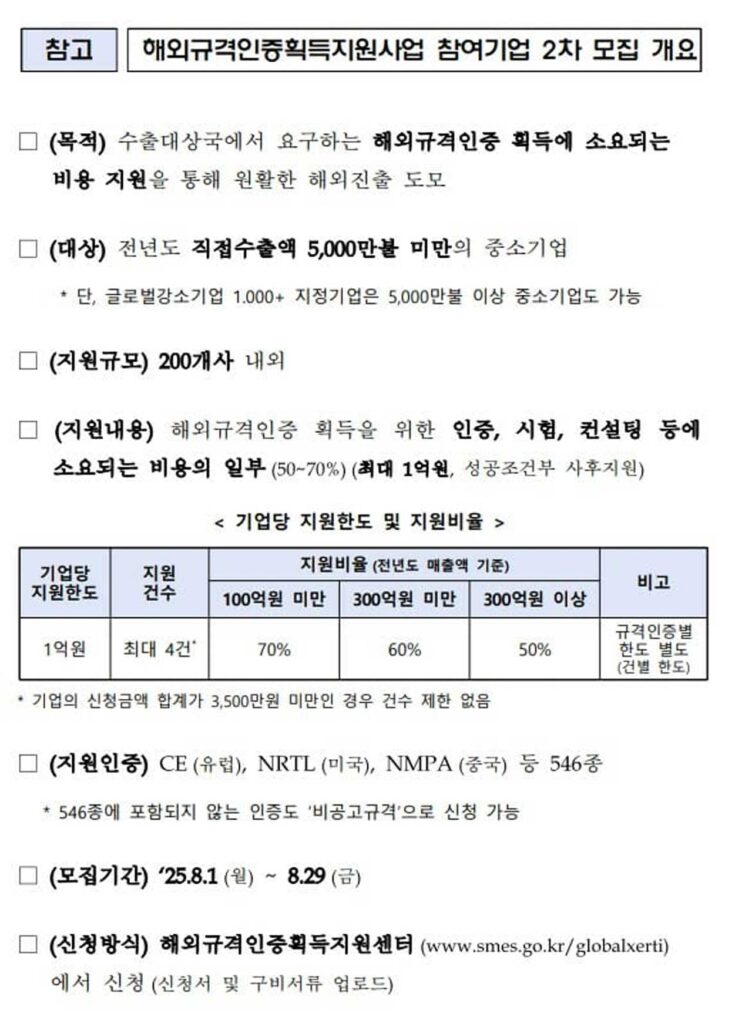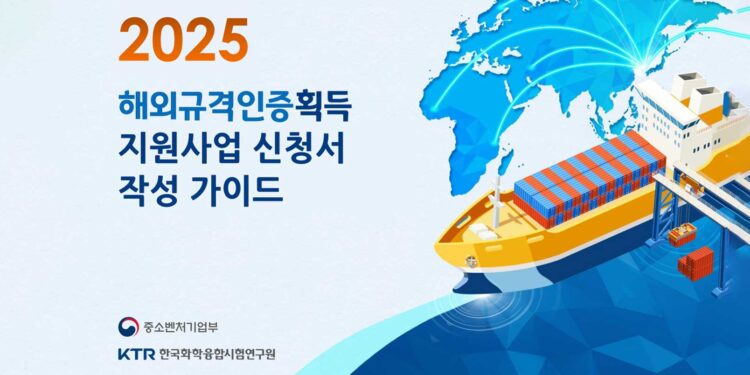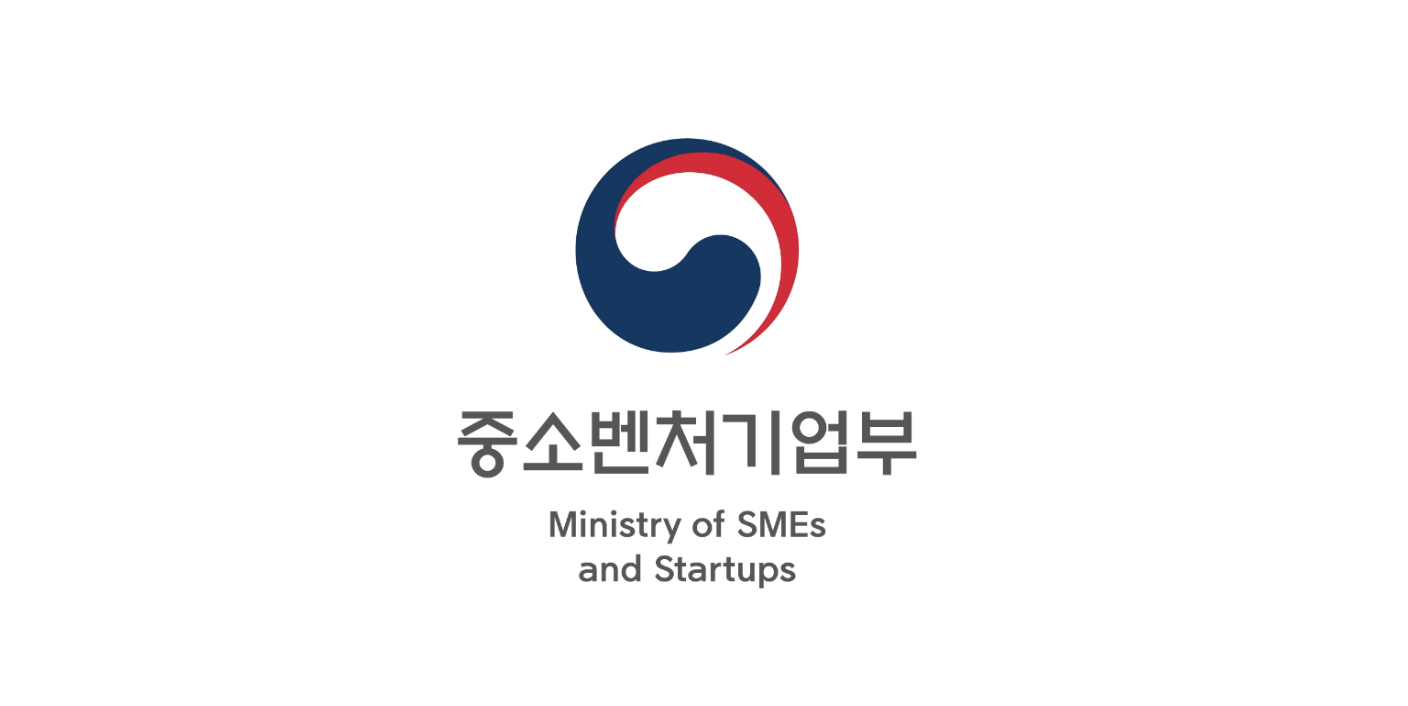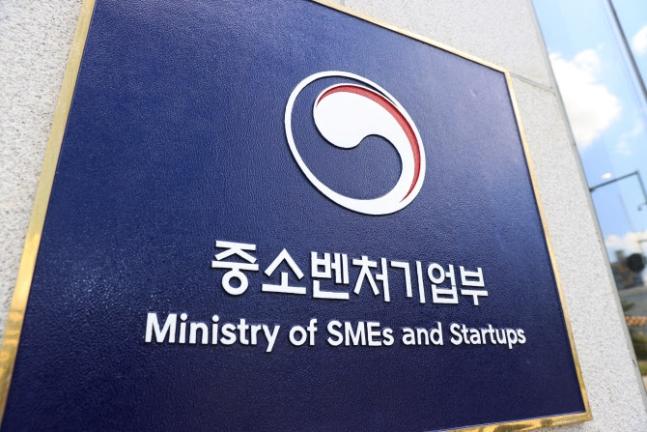The South Korean Ministry of SMEs and Startups (MSS) is offering up to ₩100 million KRW (approx. $77,000 USD) in funding support for per company for eligible startups and SMEs through the second round of its 2025 Global Certification Acquisition Support Program.
Announced on July 31, this government-backed funding program is designed to help 200 eligible Korean startups and SMEs offset the cost of obtaining internationally recognized certifications as an essential requirement for export to major global markets.
Applications open from August 1 to August 29, with funding provided post-successful certification under a conditional reimbursement model. This is the third round of the program in 2025, following earlier sessions held in February and May.
Government-Backed Support for Global Market Entry
The program targets certification expenses required by foreign markets, such as:
- CE (EU Conformité Européenne),
- NRTL (U.S. Nationally Recognized Testing Laboratory, including UL),
- NMPA (China National Medical Products Administration),
Among 546 eligible international standards—with room for additional certifications through non-listed custom applications.
Startups and SMEs may apply for up to four certifications per year, with no limit on the number of applications if the total annual request is under ₩35 million KRW (~$27,000 USD), defined as “small-scale certifications.”
Funding is classified based on company revenue:
- 70% coverage for companies with less than ₩10 billion KRW in annual sales
- 60% coverage for companies between ₩10 billion and ₩30 billion
- 50% coverage for companies over ₩30 billion
All applicants must have had direct exports under $50 million USD in the previous year. However, designated Global Small Giants (1000+ program) can apply regardless of export volume.

Korean Startups and SMEs Included in Eligibility Scope
Contrary to misconceptions that the program targets only traditional SMEs, early-stage startups also qualify as long as they meet the export and revenue criteria.
In practice, many deep tech, medtech, and hardware startups pursuing overseas expansion find certification costs to be a critical barrier—especially for regulated industries like healthcare, electronics, and safety systems.
By subsidizing certification, the government seeks to reduce dependency on third-party capital and accelerate self-driven global expansion, particularly for startups navigating U.S., EU, or Chinese markets.
Government Aims to Address Export Challenges Beyond Certification
According to Lee Soon Bae, Director of Global Growth Policy at MSS, the initiative is part of a broader policy to help startups and SMEs withstand external trade pressures—particularly U.S. tariff policy shifts and evolving non-tariff technical regulations.
“This program will not only reduce the global expansion burden on small companies but also support market diversification.
Beyond certification, we plan to strengthen policies that help startups quickly respond to export regulations as they scale globally.”
Lee Soon Bae, Director of Global Growth Policy, Ministry of SMEs and Startups.
Impact on the Startup Ecosystem in South Korea
For Korean hardware, biotech, and deep tech startups, international certification often delays go-to-market timelines or deters entry into high-barrier markets altogether. Programs like this offer:
- Cost-effective entry into foreign markets
- Faster time-to-market for global-facing products
- Stronger positioning for VC funding with certified products
- Improved ecosystem-wide competitiveness in regulated industries
With more than 200 companies expected to benefit, this initiative demonstrates the government’s growing recognition of export-readiness as a strategic startup metric—beyond just local sales or Series A milestones.
How to Apply
Eligible companies can apply between August 1–29, 2025 via the official Global Certification Support Center website. All applications are reviewed based on export volume, industry classification, and certification relevance.
Founders of startups and SMEs targeting global markets should prepare documentation early as Korean certification programs are highly competitive, and export-readiness will be a key selection factor.
Stay informed on Korea’s fast-moving startup and tech scene—follow KoreaTechDesk on social media: LinkedIn, X (Twitter), Bluesky, and Facebook for insights, funding news, and industry updates.








